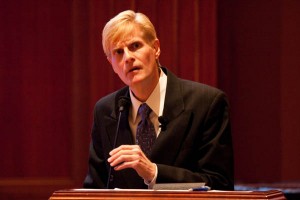By Melisa Easaw
Correspondent

Professor of counselor education Mark Kiselica shared his findings in “The Complicated Worlds of Teenage Fathers: Implications for Clinical Practice, Public Policy, and Research.” His talk on Wednesday, Nov. 4 highlighted the relationships between fathers and their children. The Faculty Senate Committee at the College asks two faculty members each year to present their research to the campus community. This fall, the faculty senate chose Kiselica.
Kiselica first talked about his relationship with his own father, who, despite having lived through many hardships, was in Kiselica’s mind “the most wonderful parent you could ask for.”
Because of the speaker’s positive relationship with his father, his “transference to men is positive … and it has implications (good and bad) for my work as a clinician and scholar.”
Kiselica said he was forced to learn about the negative aspects of fatherhood after having developed this favorable view of masculinity.
The presenter at this talk shared the sad statistic that of the teenage fathers who are engaged in their child’s lives, about one-third of them stop being a part of their child’s lives after the child turns five. Kiselica shared possible reasons for this, saying that, “The lives of adolescent fathers tend to be complicated,” and that having a child complicates their lives even further.
Kiselica said teenage fathers are three times more likely than others their age to have been victims of sexual abuse and two times more likely to be poor.
Kiselica showed two video clips from documentaries during his presentation. The first video was called, “Not Me,” and it showed men who fit the stereotype of the unstable deviant teenage father.
The next video, “Fathers Too Soon,” exhibited men who do take the responsibility of being a father by providing emotional and financial support to the child and the child’s mother.
Karachi Ukaegbu, a freshman international business major, said she learned from Kiselica’s talk.
His presentation provided her with a “point of view that I never would have gained if I did not attend this presentation.” Ukaegbu also commented on the speaker’s use of videos, which, in her opinion, helped the presentation flow smoothly.
Kiselica ended his talk in the same vein as he began. He talked about his father and the lessons he learned from him, the most important lesson being that family and people come first.






